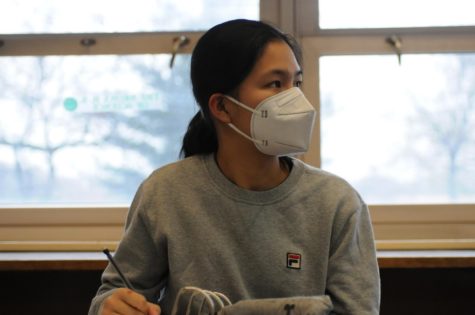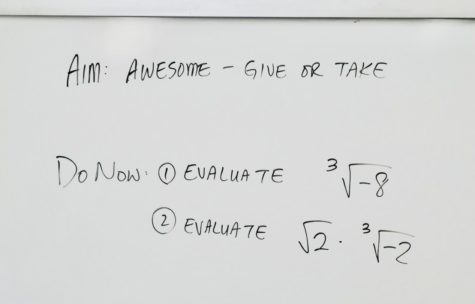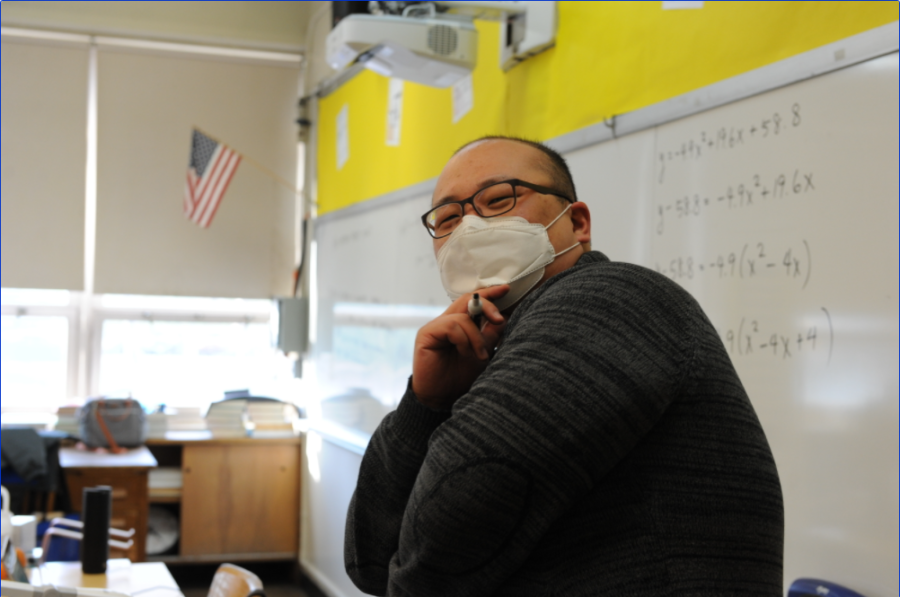Mr. Yang: From a Specialized High School Student to a Teacher
Mr. Yang is a Honors Algebra II and Game Theory teacher here at Bronx Science. His unique teaching style and love of math make students excited to come to his class every day.
Mr. Yang enjoys having fun with his students while teaching them math.
During Mr. Yang’s junior year of high school, Mr. D’s English class was always a period that he looked forward to. However, it had not always been this way. As a student, he’d had a passionate hatred for the humanities, but Mr. D made the subject dynamic and engaging. Today, Mr. Yang brings the same level of excitement and fun to his Game Theory and Honors Algebra II students at Bronx Science.
Mr. Yang grew up in Elmhurst, Queens and attended Stuyvesant High School where he indulged in a variety of extracurriculars. He formed the guitar club and was a member of National Honor Society. He thrived in an environment where he could meet new people and make long-lasting relationships.
“High school is a time where you really start developing your identity as a person. The friends you meet really shape who you become. I was fortunate enough to meet some really good friends,” he said.
Mr. Yang has always had a love for teaching; he was even a student tutor at Stuyvesant. However, he didn’t realize that he wanted to make teaching his career until he started working on his PhD in Economics. When asked why he chose to teach at Bronx Science, Mr. Yang answered, “Why not? At Bronx Science, the students are driven, and each is talented in their own way.”

While Mr. Yang loves teaching math, he does think that math education in specialized high schools needs to elevate. Yang said, “We need to go beyond learning about formulas, and solving equations for x. In the current age, we have machines and websites that can do all that for us. We need to go above and beyond simply solving problems and start learning about how to really think.”
Mr. Yang also often tries to add some fun aspects to make his students feel excited about math. For example, every day instead of putting up the aim of the day’s class as just a plain statement of the topic, he puts up a pun or reference. How it relates to math reveals itself throughout the class. Mr. Yang’s aims make his students laugh and smile at the creativity.

Mr. Yang’s thoughtful aims aren’t just to make students smile, although he does list that as one of his main intentions; they also have a purpose in the class. He said, “Sometimes I don’t want students to know what the idea is because they will often know the formula (or method) beforehand and just skip ahead to using them without paying attention to where these things come from.” Mr. Yang always puts an emphasis on the “why” of math, and his Aims are one of the ways he pushes his students to explore it. Moreover, he loves learning about the “why’s” of the world. “Knowing ‘why’ makes life more interesting instead of just accepting things as they are.”
Another way Mr. Yang has students look into the “why” of math in his Game Theory class. He developed the game theory course at Bronx Science during the 2018-2019 academic year, and it is the only one of its kind at the high school level in America. A common complaint in math classes is that there is nowhere to apply the math that has been learned, but this post-calculus course shows students why they’ve learned theoretical math. Urging students to take the popular Game Theory course, Mr. Yang said, “When do you ever need to know how to find the maximum of a parabola? Well, take Game Theory and find out!” Mr. Yang especially loves teaching the class because there are no standardized tests, so the class can go extremely in-depth.

While Mr. Yang wishes specialized high schools focused more on understanding math concepts instead of straightforward formulas, he does believe there have been improvements from when he was a student. “I [now] see a lot more effort to highlight the importance of mental health, racial/gender/sexual orientation equality, and more effort from faculty and staff to support students.” In the future, Mr. Yang hopes to see an even larger emphasis on equality and helping students.
“Knowing ‘why’ makes life more interesting instead of just accepting things as they are,” said Mr. Yang, Mathematics teacher at Bronx Science.
Kate Hankin is an Editor-in-Chief for ‘The Science Survey.’ In her journalistic writing, Kate likes to share her interests such as food, music, current...
Nicole Zhou is the Editor-in-Chief for ‘The Observatory' yearbook and a Staff Reporter for 'The Science Survey' newspaper. This is her third year revising...
Kate Hankin is an Editor-in-Chief for ‘The Science Survey.’ In her journalistic writing, Kate likes to share her interests such as food, music, current...

